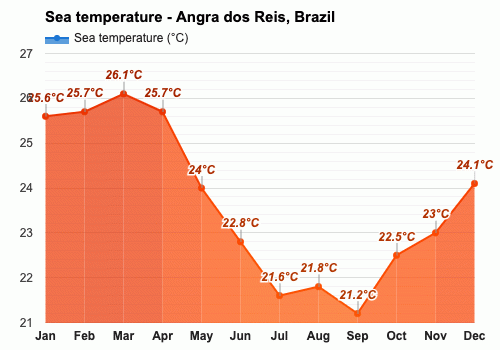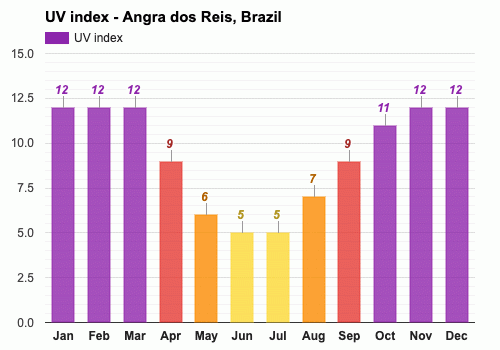Contents
- The climate of Angra dos Reis
- The best time to visit Angra dos Reis
- The worst time to visit Angra dos Reis
- Spring weather in Angra dos Reis
- Summer weather in Angra dos Reis
- Autumn weather in Angra dos Reis
- Winter weather in Angra dos Reis
- Weather in January
- Weather in February
- Weather in March
- Weather in April
- Weather in May
- Weather in June
- Weather in July
- Weather in August
- Weather in September
- Weather in October
- Weather in November
- Weather in December
- Frequently asked questions
- Average temperature
- Average humidity
- Average rainfall
- Average rainfall days
- Average sea temperature
- Average daylight
- Average sunshine
- Average UV index
The climate of Angra dos Reis
Precipitation is another significant factor shaping Angra dos Reis's weather, with impressive amounts slightly varying from month to month. The city receives its highest rainfall in January with 276mm (10.87"), while the driest month is July with a still significant 76mm (2.99") of rainfall observed. This is a clear proof of no dry season existence. Angra dos Reis experiences a generally high level of relative humidity, averaging around 82%, which adds to the damp and humid nature of its climate.
Further noteworthy weather conditions include the sea temperature, fluctuating from 26.1°C (79°F) in March to 21.6°C (70.9°F) in July, indicating warm coastal waters suitable for various water activities throughout the year. Meanwhile, the amount of daylight experienced ranges from 10.7 hours per day in June to 13.5 hours in December, directly linked to the region's latitude.
The best time to visit Angra dos Reis
The worst time to visit Angra dos Reis
Spring weather in Angra dos Reis
Summer weather in Angra dos Reis
Autumn weather in Angra dos Reis
Winter weather in Angra dos Reis
Weather in January
Weather in February
Weather in March
Weather in April
Weather in May
Weather in June
Weather in July
Weather in August
Weather in September
Weather in October
Weather in November
Weather in December
Frequently asked questions
What is the wettest month in Angra dos Reis?
How much does it rain in Angra dos Reis?
What is the month with the highest UV index in Angra dos Reis?
What is the warmest month in Angra dos Reis?
What is the least humid month in Angra dos Reis?
What are the months with the most sunshine in Angra dos Reis?
What is the month with the warmest sea water in Angra dos Reis?
What is the month with the shortest days in Angra dos Reis?
What are the months with the lowest UV index in Angra dos Reis?
What part of the year is the coldest in Angra dos Reis?
What is the driest month in Angra dos Reis?
What is the month with the coldest sea water in Angra dos Reis?
What is the month with the least sunshine in Angra dos Reis?
What is the most humid month in Angra dos Reis?
When are the longest days in Angra dos Reis?
Is there Daylight Saving Time (DST) in Angra dos Reis?
Average temperature
Angra dos Reis, Brazil

The warmest month (with the highest average high temperature) is February (30.4°C).
The month with the lowest average high temperature is July (24.6°C).
The month with the highest average low temperature is February (23.1°C).
The coldest month (with the lowest average low temperature) is July (16.5°C).
Average humidity
Angra dos Reis, Brazil

The month with the highest relative humidity is October (83%).
The month with the lowest relative humidity is February (80%).
Average rainfall
Angra dos Reis, Brazil

- Average rainfall in January:
276.4mm - Average rainfall in February:
240.2mm - Average rainfall in March:
237.1mm - Average rainfall in April:
189.5mm - Average rainfall in May:
109mm - Average rainfall in June:
78.3mm
- Average rainfall in July:
76.2mm - Average rainfall in August:
78.2mm - Average rainfall in September:
116mm - Average rainfall in October:
144.1mm - Average rainfall in November:
166.6mm - Average rainfall in December:
265mm
The wettest month (with the highest rainfall) is January (276.4mm).
The driest month (with the least rainfall) is July (76.2mm).
Average rainfall days
Angra dos Reis, Brazil

- Average rainfall days in January:
19 days - Average rainfall days in February:
15 days - Average rainfall days in March:
15 days - Average rainfall days in April:
13 days - Average rainfall days in May:
11 days - Average rainfall days in June:
9 days
- Average rainfall days in July:
9 days - Average rainfall days in August:
9 days - Average rainfall days in September:
11 days - Average rainfall days in October:
16 days - Average rainfall days in November:
18 days - Average rainfall days in December:
20 days
The month with the highest number of rainy days is December (20 days).
The months with the least rainy days are June, July and August (9 days).
Average sea temperature
Angra dos Reis, Brazil

The best month for swimming (with the highest average sea temperature) is March (26.1°C).
The coldest month (with the lowest average sea temperature) is September (21.2°C).
Average daylight / Average sunshine
Angra dos Reis, Brazil

- Average daylight in January:
13h and 2min - Average daylight in February:
12h and 5min - Average daylight in March:
12h and 1min - Average daylight in April:
11h and 4min - Average daylight in May:
11h and 0min - Average daylight in June:
10h and 4min
- Average daylight in July:
10h and 5min - Average daylight in August:
11h and 2min - Average daylight in September:
12h and 0min - Average daylight in October:
12h and 4min - Average daylight in November:
13h and 1min - Average daylight in December:
13h and 3min
The month with the longest days is December (Average daylight: 13h and 30min).
The month with the shortest days is June (Average daylight: 10h and 42min).
The months with the most sunshine are February and July (Average sunshine: 6h).
The months with the least sunshine are September, October, November and December (Average sunshine: 4h).
Average UV index
Angra dos Reis, Brazil

The months with the highest UV index are January, February, March, November and December (UV index 12).
The months with the lowest UV index are June and July (UV index 5).
Angra dos Reis, Brazil
Weather forecast for your location
2. Allow the app to use your location


